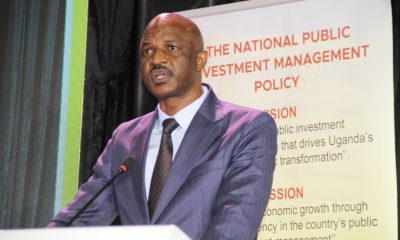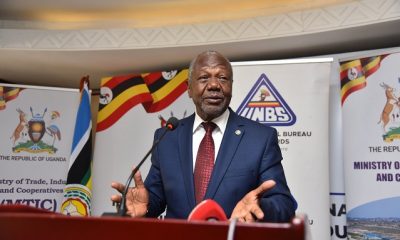Analysis
Why Ugandan economy is sick
People are broke, inventories are piling up, businesses are struggling to stay up, banks are struggling, government is struggling to pay its workers and creditors, and the cycle can only turn into spiral effect!
Last week, Keith Muhakanizi, the Secretary to the Treasury said something that seems to represent the opinion of the economists and some other senior leaders working in government and at the Bank of Uganda. “The economy is okay,” Muhakanizi said. “It is only a few vocal elites that exaggerate the state of the economy, portraying it as a crisis.”
Muhakanizi said this on Saturday August 13, 2016 while appearing on the Capital Gang talk show, on Capital FM radio. The previous day, a friend of mine, a serving senior military officer had called me, and in an apprehensive tone said, “Ramathan, can you imagine these guys at Bank of Uganda are telling me the economy is fine! What is wrong with you economists?”
It is Ha-Joon Chang, an economist at the University of Cambridge, who once said, “Very often, the judgments by ordinary citizens may be better than those by professional economists, being more rooted in reality and less narrowly focused.”
Muhakanizi and many of his colleagues at Ministry of Finance, Planning and Economic Development (MoFPED) as well as those at Bank of Uganda (BoU) have been in government for far too long, and with unlimited access to free money, to feel the pinch of economic downturn. It is really understandable.
How do you expect a man who has never opened a private ledger book or even tanked his vehicle from own pocket understand moments like the prevailing situation?
I often say that people like Muhakanizi, Mutebile (the BoU Governor), and others who have been in government for decades, enjoying a lot of privileges, are too detached to understand the realities on the ground. They rely too much on (unreliable) statistical figures to inform their opinions about the economy.
Muhakanizis are mismeasuring our lives”
In the words of Joseph Stiglitz and Amartya Sen — the two living economics philosophers — people like Muhakanizi are “mismeasuring our lives”. They tend to emphasise what matters less (statistics) and ignore what matters most (people’s well-being). I think we need to emulate countries like Bhutan, the small kingdom in South Asia in the Himalayas that have reduced reliance on nationally generated statistics.
In Bhutan, apart from the GDP, they use what they call Gross National Happiness (GNH) as a better index to measure progress.
In the GNH index, apart from the economic statistics that Ugandan officials love to cite whenever they are asked to explain the health of the economy, their Bhutan counterparts also look at other indicators of well-being, things such as governance, knowledge and health, community services, culture, spirituality, psychological welfare, and the environment. The GNH index was introduced in Bhutan 1972 when their King then, Jigme Singye Wangchuck, proposed it.
In 2015 the World Bank ranked Bhutan as the 158th out of 217 countries in the world with a GNI per capita of $2,370. This income per capita is about three-and-half higher than what Ugandans currently earn a year — $670. So Bhutan is already enjoying the middle-income status that Uganda is aspiring to achieve.
The government of Bhutan benchmarked this ranking with their own GNH Index to determine whether the people were actually happy. The 2015 GNH Index shows that about 8% of the Bhutanese were ‘deeply happy’, 35% ‘extensively happy’, and 48% ‘narrowly happy’, while about 9% were unhappy.
I would love to look at opinions of Ugandans as far as their lives are concerned. Are Ugandans happy in the prevailing economic condition? Which categories are happier than others? Which age groups, occupations, regions, etc. are happier than others?
UBOS statistics are contestable
In Bhutan, for example, the 2015 GNH index found that men were happier than women. It also found that people living in urban areas were happier than rural residents.
They further found that more educated people were happier, and that farmers were less happy than other occupational groups. The increases in happiness among people were driven by improved living standards and service delivery, better health, and participation in cultural festivals.
Most importantly, the National Statistics Bureau (NSB) of Bhutan found that, on average, general happiness among the Bhutanese had increased by 2% between 2010 and 2015, although the GNI per capita had increased by 16%.
This clearly shows that money is important but other things are equally important, sometimes much more important. The fast rising incomes of the Bhutanese, at a rate of 16% between 2010 and 2015, brought about much lower increase in happiness, by just about 2%.
Therefore, Muhakanizi’s utterances made me think aloud: why don’t we adopt the GNH index in Uganda? The GDP related statistics are contestable.
Those in government are saying the economy is doing well, while those outside do not feel the steady-progress, instead are feeling the pinch of the economic hardship. Let us go for the less contestable metric. Feeling happy is always better than feeling sad.
The Gallup, the organisation whose World Poll tracks people’s opinions on aspects that impact happiness, often report that although people in poor countries such as Uganda may sometimes report that they are happy, and those in rich countries, who seem to have everything, may report that they are unhappy, the common finding is that the happiest people reside in well-functioning societies.
I strongly believe that had Muhakanizi asked the ordinary folks anywhere in Uganda about the state of the economy, they would have told him the real truth.
There used to be a time when Ugandans used to report differently from what they actually were enduring. Psychologists call it the “adaptation effect” — people living in desperate circumstances for too long can come to believe that this is the best that life can offer and report that they are happy.
Blame bad politics
A decade ago, Ugandans used to be ranked the happiest in the Eastern and Central Africa, closely followed by the Congolese! Last year Ugandans reported that they were less happy than they were 10 years ago, ranking below countries such as Niger, DRC and even South Sudan.
The adaptation effect is long over in Uganda. In most of the recent life evaluation surveys, Ugandans have generally reported that they are dissatisfied with their lives. Life evaluation measures are often in close accord with measures of income, health, and political freedom.
For DRC, the adaptation effect seems to be still on. Having lived in desperate circumstances for decades the Congolese have come to believe that what they are enduring is the best that life can offer them, and they decided to spend their shorter lives drinking alcohol and dancing to Lingala music.
On a serious note the authorities at BoU and Ministry of Finance need to get serious. They love to downplay the realities in the economy. Although in the past the economy used to experience some transitory business cycles, particularly after the general election or during a global crisis, what is going on might not be business as usual.
The economy has been performing poorly in the past six years, relative to the previous periods. Since 2011 general election and its aftermath — characterized by walk-to-work and high inflation — Uganda’s economy has failed to fully recover. And it’s not accident. The events, internally, regionally, and externally, have made it difficult for the economy to function.
Internally, for the past six years, Uganda has experienced very bad politics which caused insecurity (although not instability per se), uncertainly, and thus increased political risk. The impact of political risk has been cumulative since 2006. Uganda’s political climate has never been the same again. Other internal factors which people love to point at could be symptoms.
Need for structural and political reforms
Regionally, the civil strife in South Sudan has greatly affected our economy. Since 2008, South Sudan has been one of the single most important trade partners for Uganda. On average we have been earning from South Sudan a million dollars in export value every single day. This is no more.
Externally, apart from the global economy that is not performing well thus creating some contagion effects on Uganda’s economy, the disappearance of donor money has posed a serious threat to the economy.
The official development assistance (ODA) to Uganda has drastically dwindled both because many of our former Good Samaritans are also broke, and most importantly many of them are no longer our friends. Uganda has committed so many “crimes” in recent years to deserve free money.
Mr. President, from writing oppressive gay laws to harassing political opponents and other citizens, your government has committed very many sins to attract the hordes of money we used to receive in the years gone by. Even civil society organisations that used to bring in money are dry.
Therefore, the days when Ugandans used to survive even without government are over. We are back to the 1990s when nearly all Ugandans were looking at government.
Truth be told to Mr. Muhakanizi and colleagues; the economy you are superintending is sick. People are broke, aggregate demand is low, inventories are piling up, businesses are struggling to stay up, banks are struggling to collect interest payments, URA is struggling to collect tax, government is struggling to pay its workers and creditors, and the cycle can only turn into spiral effect. No amount of rosy scenario will reverse that. Structural and political reforms, restoration of fiscal discipline, and may be luck, will.
Comments



























